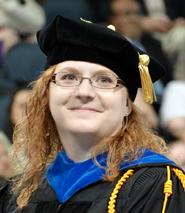
Mari Plikuhn, PhD
Mari Plikuhn is an Assistant Professor of Sociology in the Department of Law, Politics, and Society at the University of Evansville. In her time at UE, she has been honored to receive the Chi Omega Professor of the Year Award and the University of Evansville Outstanding Teacher Award--the highest award for teaching at the University. She was also awarded the Teaching Innovations and Faculty Development Award from SAGE Publishers and the American Sociological Association’s Section on Teaching and Learning.
How did you develop your teaching philosophy and skills while at Purdue? (More generally, what experiences did you have at Purdue that helped form your current career?)
Several aspects of my Purdue experience allowed me to grow as a teaching-scholar. In addition to a rigorous graduate curriculum that prepared me to be a generalist in the field, I was fortunate to take the Teaching Sociology course to strengthen my pedagogical skills. The graduate teaching training afforded through Center for Instructional Excellence helped me to develop both basic and advanced classroom techniques and connected me to innovative ideas from faculty and other graduate students across campus. Finally, my work with the Purdue Teaching Academy and the Committee for the Education of Teaching Assistants allowed me to develop a strong network of teaching-scholars from around the university.
In what ways are you engaging Evansville students in the study of aging?
Three of the upper-level substantive courses that I teach focus on aging or life course transitions across time: Aging and Society, Death and Dying, and Marriage and Family. In addition, I serve as the advisor for all Sociology majors as well as those with a specialization in Gerontology, and coordinate with our Health Services Administration and Nursing departments to integrate our aging and life course Sociology courses into their curriculum. I have collaborated with several students to present research at the Gerontology Society of America’s Annual Meetings and encourage students to remain active in the study of aging and the life course. Finally, I am in the process of developing an interdisciplinary minor in Life Course Studies for the University.
What do you remember best about your time in the Center on Aging and the Life Course?
The relationships I developed through being a part of the Center on Aging and the Life Course at Purdue were some of the best from my graduate career. In a university setting that often values scholarship “silos” instead of collaboration, CALC was truly an interdisciplinary marvel, drawing together the best faculty and graduate students from across the university. Being a part of a strong, collegial multidisciplinary program like CALC served as a great model in preparing me for teaching at a liberal arts university where interdepartmental collaboration is the expectation.